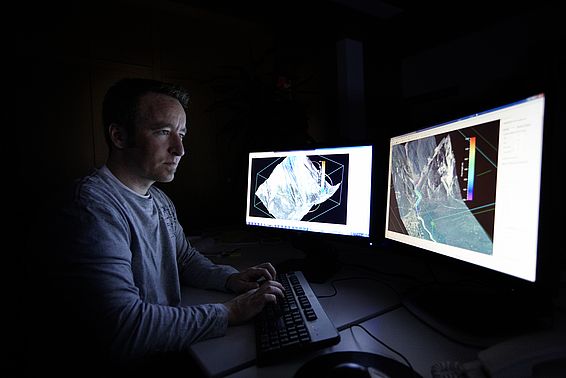The Canton of Grisons and the Federal Institute for Forest, Snow and Landscape Research (WSL) are establishing a new research centre employing up to 40 people in Davos. From January 2021, the centre will examine social and economic issues connected with climate change, extreme events and natural hazards in mountainous regions. ETH Zurich will also be involved, through two professorships.
Leading scientists worldwide agree that global climate change is progressing fast. The influence of climate change on extreme weather and natural events in the Alpine region is particularly strong, as warming levels here are twice as high as the global average, with consequences ranging from flooding, debris flows and landslides to extended droughts in summer. Events like these can have social and economic effects, as illustrated by the rock avalanche and ensuing debris flows that struck Bondo in the Val Bregaglia.
With this in mind, the Federal Research Institute for Forest, Snow and Landscape (WSL), which already has a base in Davos in the form of the WSL Institute for Snow and Avalanche Research (SLF) and employs some 140 people there, teamed up with the government of the Canton of Grisons to find ways of giving additional weight to the issues of climate change and natural hazards in the Alpine region. They resolved to set up a leading international research centre in Davos, with ETH Zurich coming on board too. The project participants made the relevant funding decisions by early June.
Two new professorships and 40 new jobs ¶
“If we are to deal with natural hazards effectively, we need to develop new knowledge and innovative solutions. This is the only way that people will be able to live and do business in mountainous regions in the long term,” said Head of SLF Jürg Schweizer at a press conference on 12 June 2020, when the collaboration was first presented to the public.
The proposed centre will cover six research areas and will entail the creation of two new professorships, which will be jointly funded by WSL and ETH Zurich. “Our internationally recognised environmental and climate research means that we have a strong network to support the two proposed joint professorships with WSL. At the same time, we will be able to expand our knowledge of the effects of climate change in the mountainous regions that are so important to Switzerland,” commented ETH President Joël Mesot.
One of the professorships is to focus on research into alpine mass movements and permafrost, while the second will concentrate on the impact of climate change on mountainous regions. The centre’s other areas of research will include early-warning mechanisms, mountain ecology and protective forests, as well as risk communication and resilience – in other words, the ability to cope with natural hazards and reduce vulnerability. The basic funding made available for the new centre will allow the creation of up to 40 new jobs.
CHF 72 million for the first 12 years ¶

The basic funding for the first 12 years (2021–32) amounts to around CHF 6 million a year, of which the Canton of Grisons will contribute CHF 2 million, WSL CHF 3 million and ETH Zurich CHF 1 million. This will cover basic activities, while third-party funding will be used to finance any expansion plans from 2023 onwards.
The research centre will be formally founded this year and will begin operating as part of WSL on 1 January 2021. It will be located at SLF’s Davos premises, where work on an extension will get under way this summer. “WSL has a strong presence in the region and has been studying mountain-related topics like avalanches and rockfalls for many years. It has won recognition among the users of its research findings, which is key for the transfer of knowledge,” said Director of WSL Konrad Steffen.
First measure in Grisons’ innovation strategy ¶
The centre’s foundation is the first visible measure to be undertaken as part of Grisons’ 2021–24 government programme and underpins the innovation strategy adopted by the canton last year. “Research at Davos will be boosted in the long term through the creation of up to 40 highly skilled jobs,” noted Cantonal Councillor Marcus Caduff, Head of the Department of Economic and Social Affairs. This will enhance the transfer of knowledge and technology for both the regional economy and the cantonal government, coupled with the specific objective of ensuring that Grisons and other mountainous regions remain attractive, liveable and safe places for people to reside.
The research centre will not only help to stimulate innovation in Grisons, it will also bolster the canton’s tertiary-education and research strategy. According to Cantonal Councillor Jon Domenic Parolini, Head of the Canton of Grisons’ Department of Education, Culture and Environmental Protection, “the new research centre will make an important social, economic and educational contribution to the further development of our canton”.
Contact ¶
Regierungsrat Marcus Caduff
Kanton Graubünden
Vorsteher Departement für Volkswirtschaft und Soziales
marcus.caduff(at)dvs.gr.ch
081 257 23 01
Regierungsrat Dr. Jon Domenic Parolini
Kanton Graubünden
Vorsteher Erziehungs- Kultur- und Umweltschutzdepartement
jondomenic.parolini(at)ekud.gr.ch
081 257 27 01
Prof. Dr. Joël Mesot
ETH Zürich
Präsident der ETH Zürich
joel.mesot(at)sl.ethz.ch
044 632 20 17
Documents ¶
Research areas of the new research centre (pdf, Download)
Copyright ¶
WSL and SLF provide the artwork for imaging of press articles relating to this media release for free. Transferring and saving the images in image databases and saving of images by third parties is not allowed.


